Cleaning a coin should only be done if it holds sentimental value rather than monetary importance or if it isn’t exceptionally rare. You might want to think about cleaning your coins initially if you collect regular common coins like Lincoln pennies that are neither rare nor old.
In the case of silver coins, however, you need to be a little tricky. Various methods have been developed to clean silver coins safely at home and restore them to like-new condition. This article is going to present to you 10 such tried-and-true techniques in this regard.
The best thing about them is that they just need a few basic materials, and the practical processes aren’t all that challenging either. So let’s get started and see what we can accomplish about cleaning both new and tarnished silver coins alike.
1. Cleaning Silver Coins Using Distilled Water
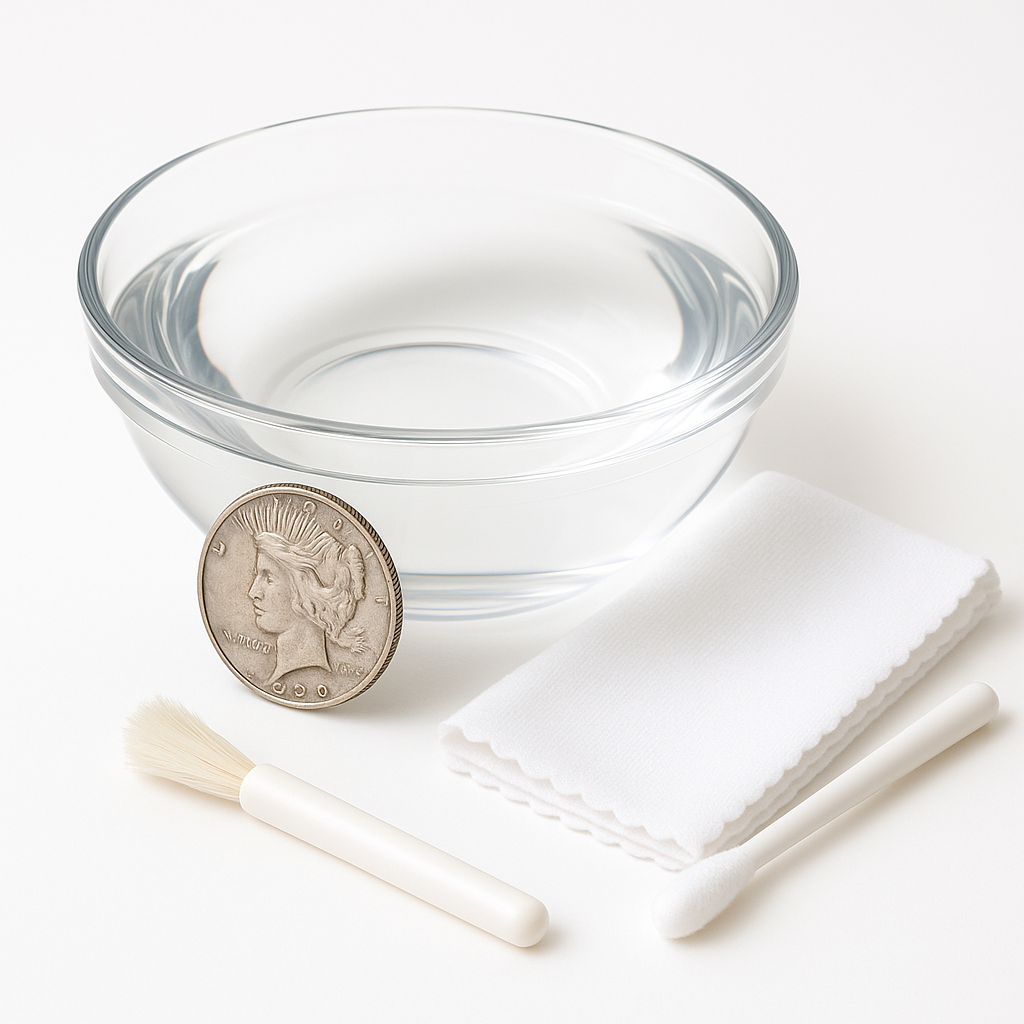
Using distilled water is a pretty straightforward technique. Often, the coins have a mineral deposit on them that can be removed by soaking them in distilled water.
Materials Required:
- Distilled water
- A ceramic/ glass/ plastic container
- Soft bristle brush or sponge
- Soft towel for drying
Method:
Simply let them soak for two to three days, and then scrub them lightly with a sponge, bristle brush, or your fingertips. This is effective with coins that aren’t entirely tarnished and turned black.
2. Cleaning Silver Coins Using White Vinegar
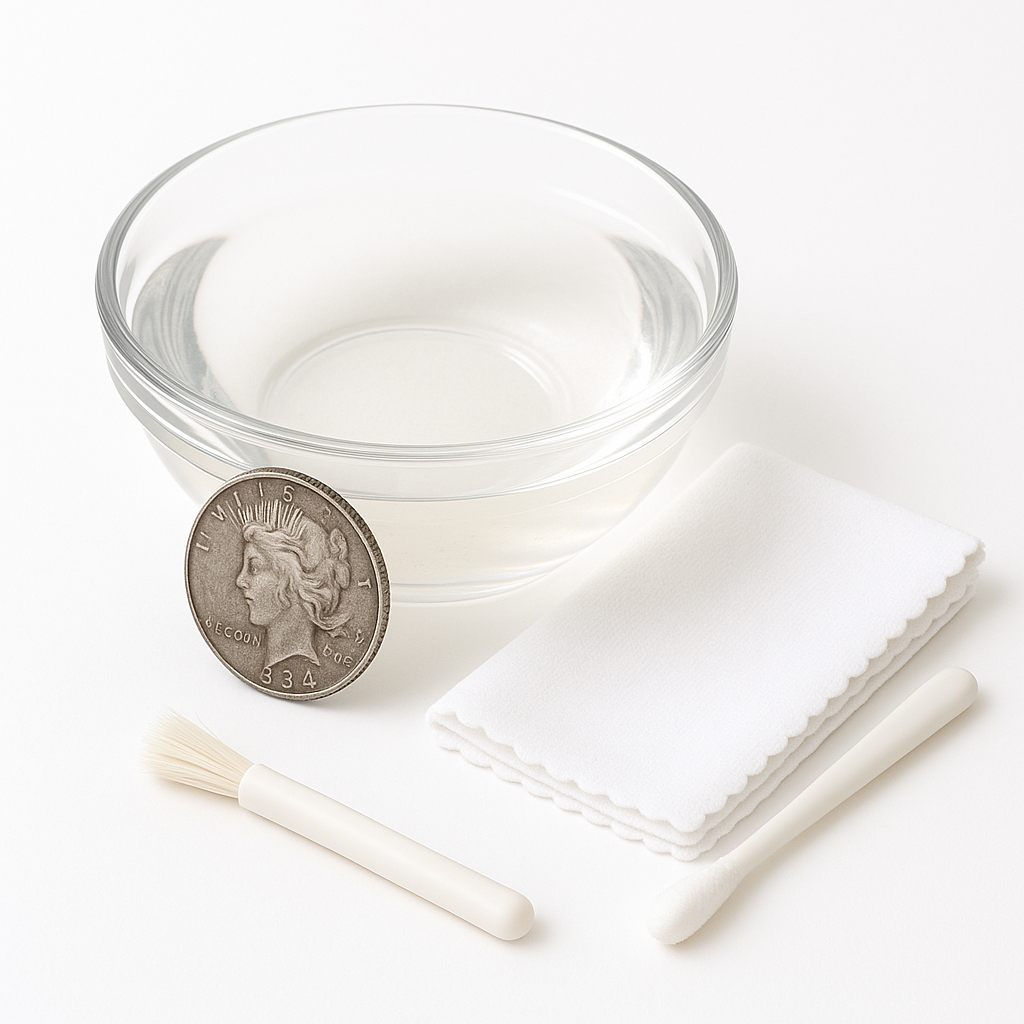
It’s extremely simple to clean silver coins using vinegar. Put the coin in a container filled with vinegar. Make sure the coin is fully submerged. Give it 20 to 30 minutes to stay inside. After that, remove the coin and scrub it with a sponge or toothbrush. Rinse with lukewarm water and pat dry.
Don’t let the coin sit in the vinegar for any longer than 30 minutes. Vinegar is a strong solvent that could harm the coins. Even better, you can clean the coins using a paste prepared by mixing vinegar and baking soda.
3. Cleaning Silver Coins Using Detergent Solution
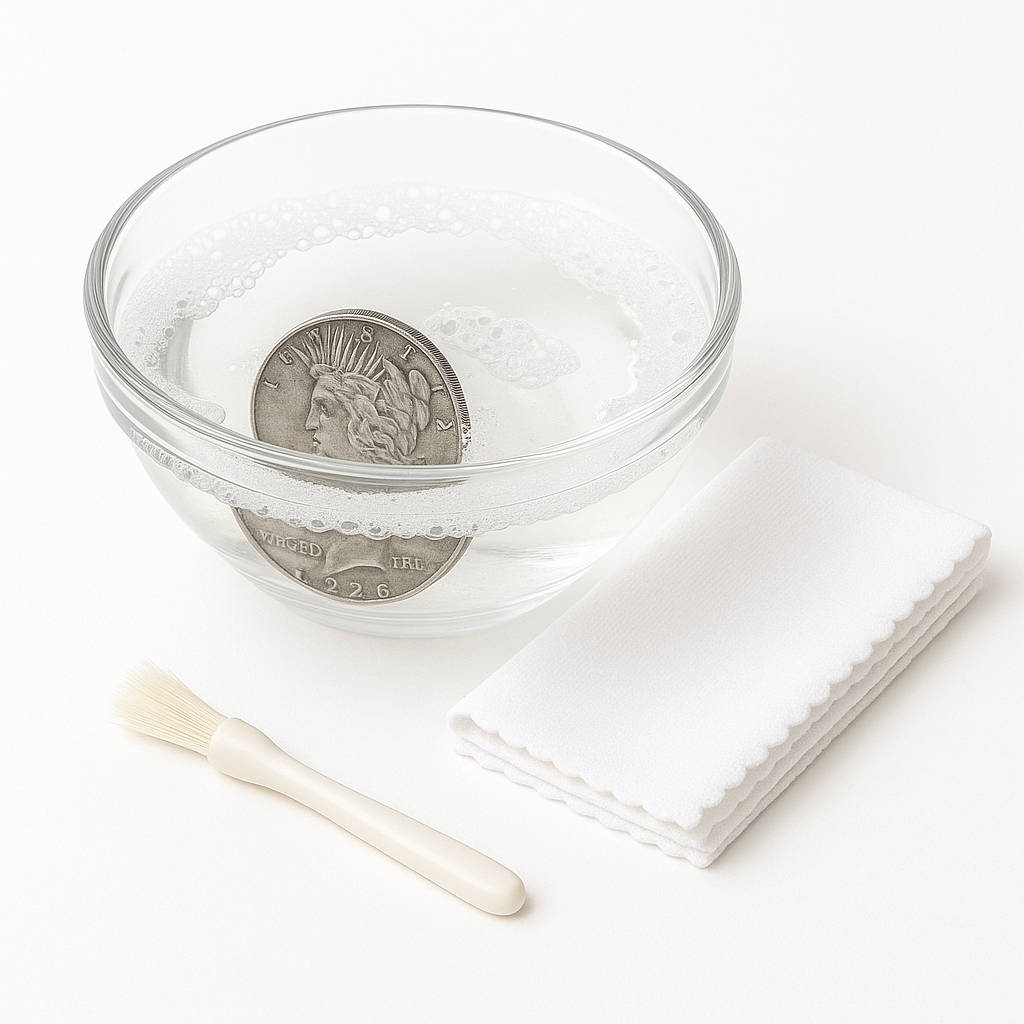
This is yet another popular method.
Materials Required:
- Mild liquid detergent/ dishwashing soap
- Distilled water
- A container
- Scrub or toothbrush
- Towel for drying
Method:
Make your DIY silver cleanser by mixing distilled water with a mild liquid detergent, then immerse your coins in it for the night. After that, scrub with a sponge or toothbrush until the soot is eliminated.
4. Cleaning Silver Coins Using Baking Soda

Get an old toothbrush and some baking soda. Now, wet the silver coins in plain water. Next, coat them completely on all sides with baking soda, and then scrub them thoroughly with an old toothbrush.
If the coin seems too dry, wet it a little more. You can remove the tarnish and soot-like film by giving it a quick brushing on both sides.
5. Cleaning Silver Coins Using Lemon Juice
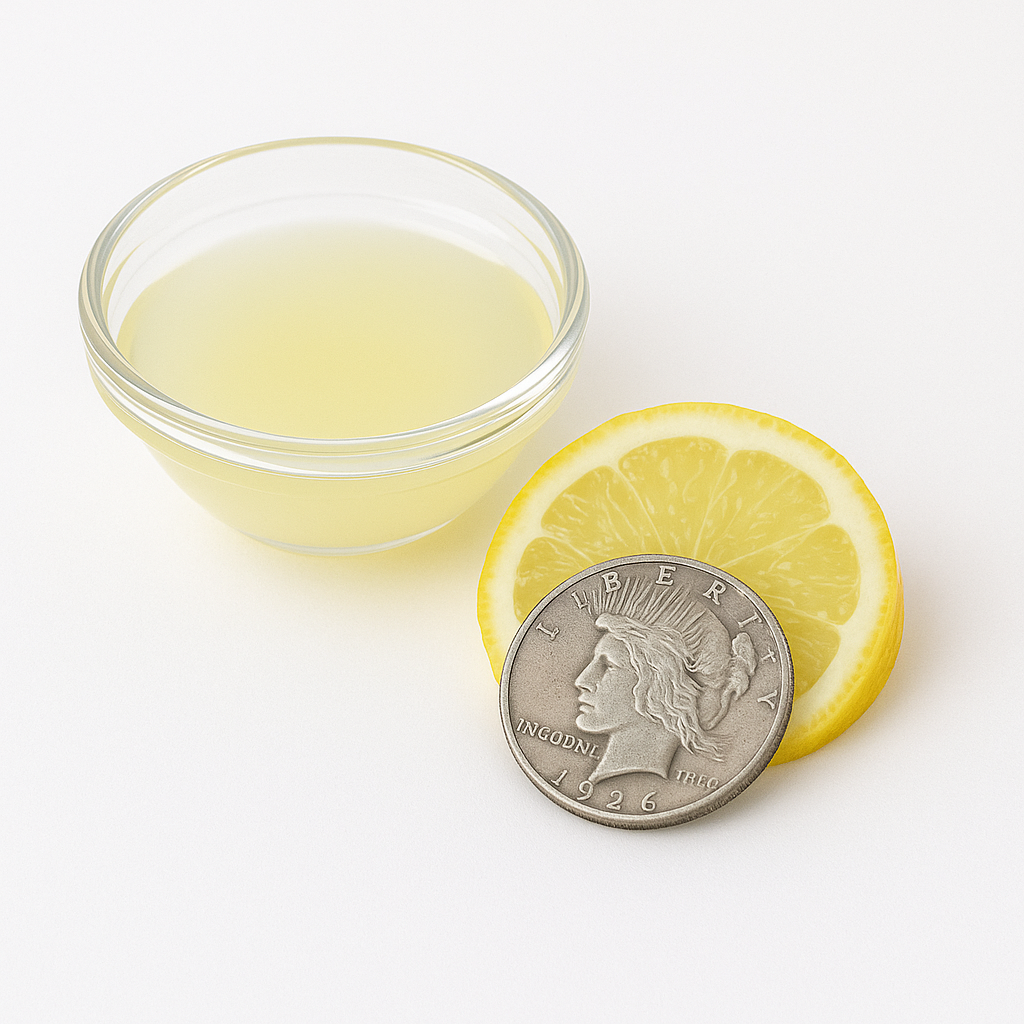
Since lemon juice has high acidity, cleaning silver with it in its pure form could cause damage. Use a different process instead of soaking silver coins in lemon juice. Here’s how to do it –
Materials Required:
- Lemon juice
- Distilled water
- Toothpick
Method:
Dilute the juice to lower its acidic content. After that, take a toothpick and dip it in this solution. Apply this solution now to the tough spots of the coins. Give it a couple of minutes to sit. Finally, rinse the coins with distilled water before pat drying.
6. Cleaning Silver Coins Using Coke
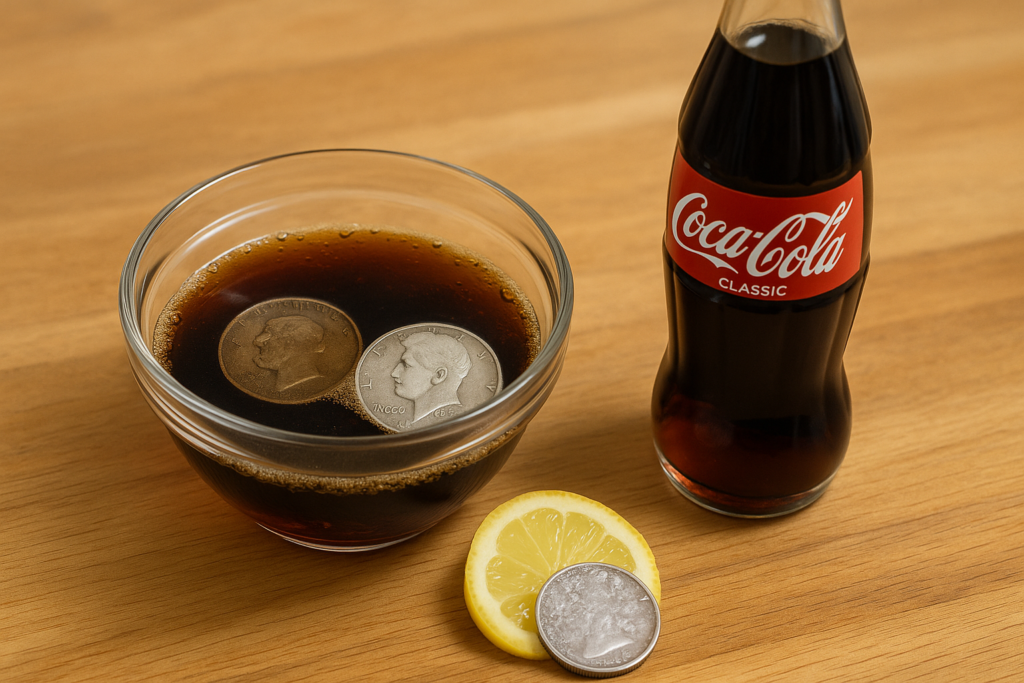
Yes, that Coke you enjoy sipping on a hot day may also be used to clean coins. The oxides that lead to tarnishing and corrosion of silver coins can be removed by the phosphoric acid found in Coca-Cola.
Materials Required:
- A can of Coca-Cola
- Distilled water
- A container
- A soft towel
Method:
Fill the container with Coke after putting in your coins. Allow the coins to soak in the liquid for about 5 minutes. Then, check if the corrosion has been removed. If the coins are still dirty, keep them in the container for a maximum of 15 minutes.
The acid of Coke can dissolve the metals if allowed to sit for significantly longer than 15 minutes. After 15 minutes, rinse the coins well with distilled water and pat dry using a soft towel.
7. Cleaning Silver Coins Using Electrolysis
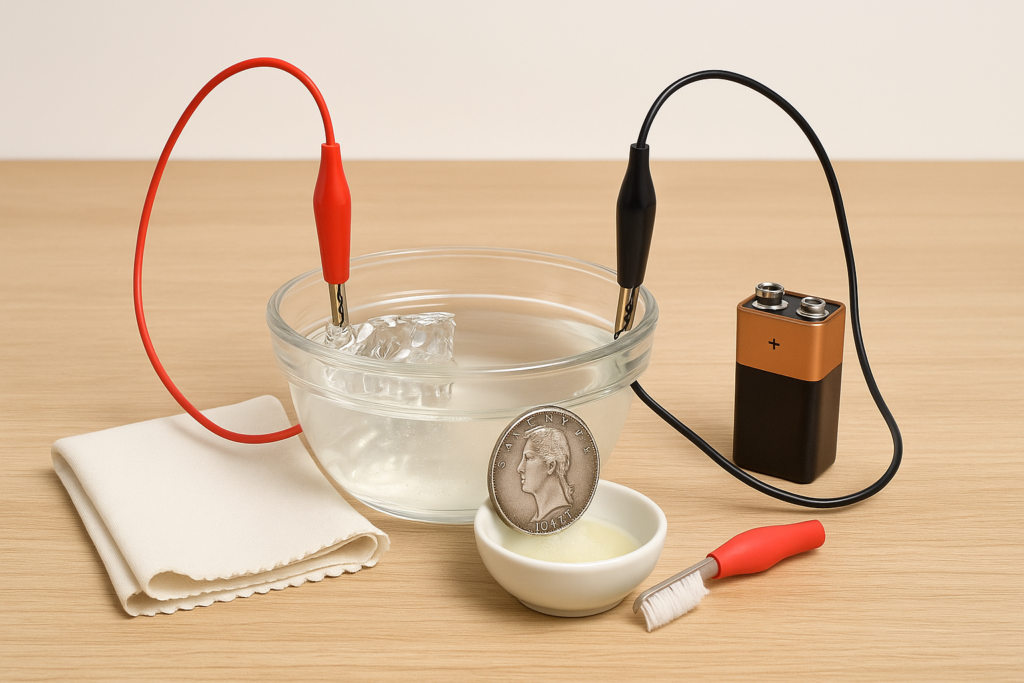
If you’ve never witnessed a coin being cleaned by electrolysis, you might be startled and amazed when you do. The tarnished coin could be seen changing in a matter of seconds from murky brown to bright silver.
Note – I do not recommend using table salt for it, although many people choose to. The electrolytic solution can undergo a chemical reaction that releases chlorine gas when table salt is added.
Materials Required:
- Distilled water
- Baking soda
- Aluminum foil
- Glass broiling pan
Method:
Place a layer of aluminum foil at the bottom of the pan that is bigger than the silver coin. Place the coin in the middle of the aluminum foil, fill the glass pan with water and some baking soda, and you’ll then watch the tarnish go away. After removing the silver coin, thoroughly rinse it with clean water. Use a towel to dry.
8. Cleaning Silver Coins Using Olive Oil
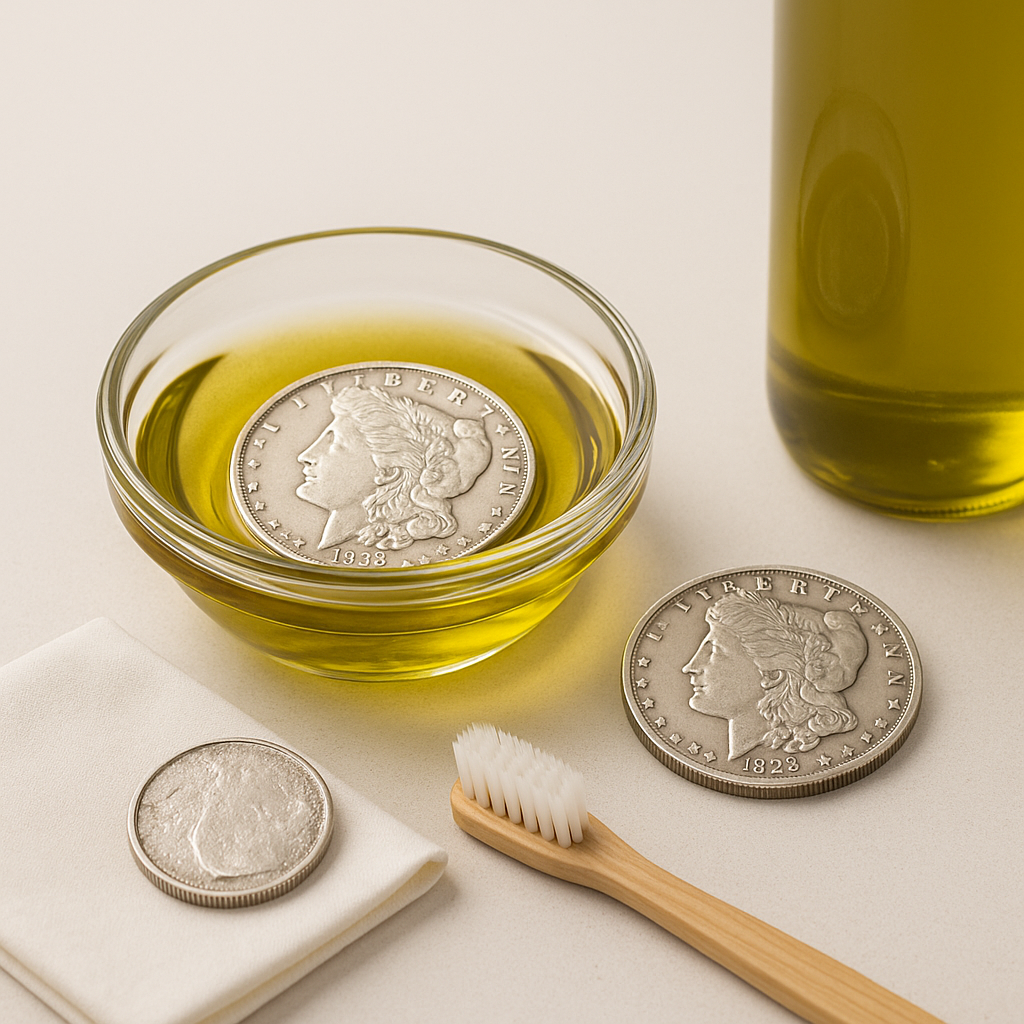
This procedure will take a significant amount of cleaning time. To be precise, it’ll take months to actually work. Nevertheless, I’m including this one so that you know how to do it if you choose to do it.
Materials Required:
- A container
- Olive oil
- Soft towel to pat dry
Method:
You simply need to put the coins in an olive oil-filled container. Just let the coins rest there. Every time the olive oil turns black, change it. Give the coins about three months to soak. You then just wash the oil away with water and pat the coin dry.
9. Cleaning Silver Coins Using Ketchup
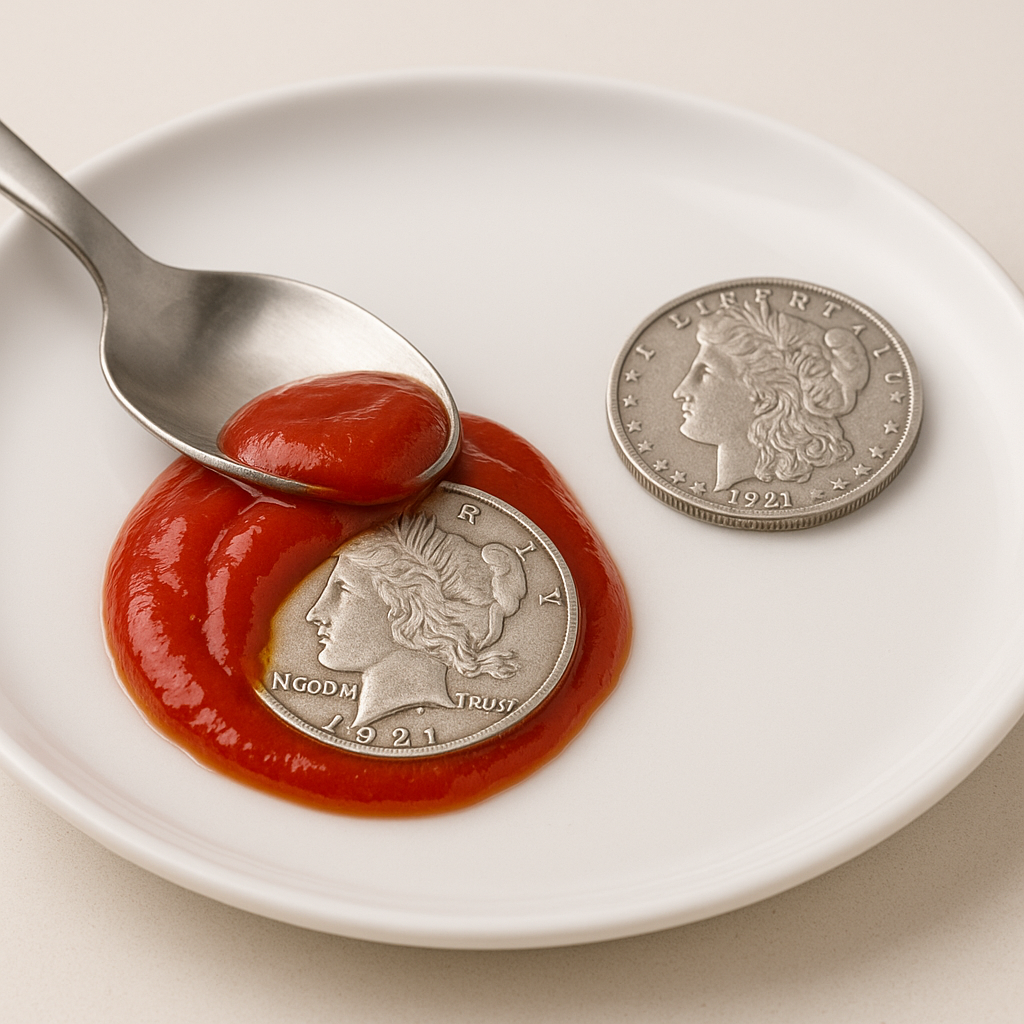
Ketchup can be used to clean coins, in case you didn’t know. The acidic tomatoes and salt can disintegrate the years’ worth of dirt that has accumulated on your coins.
Materials Required:
- A container
- Tomato ketchup
- Distilled water
- Soft towel
Method:
Put your coin in a container and pour ketchup on it to cover it. Give the coin at least 30 minutes, but not more than overnight, to soak. Take out the coin, then use the toothbrush to thoroughly remove the residual stuff. Clean the grime off with distilled water, then dry it with a towel.
10. Cleaning Silver Coins Using Hydrogen Peroxide
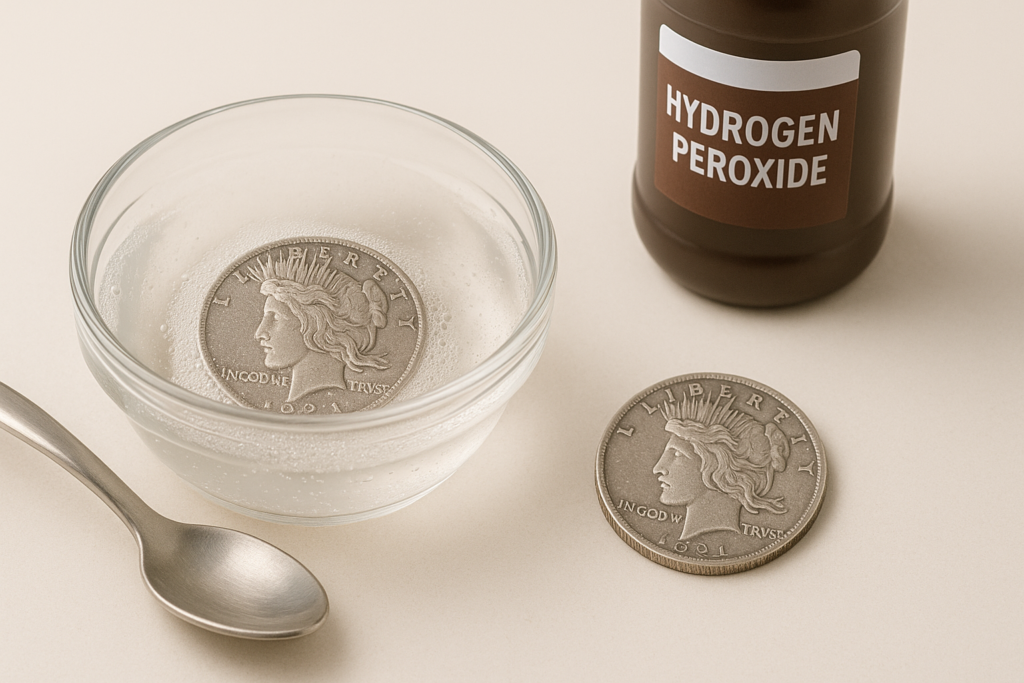
It’s another popular method. The years of grime on the coins will be eliminated and your silver ns will be sterilized by hydrogen peroxide.
Materials Required:
- Hydrogen peroxide
- Distilled water
- A container
- A soft towel
Method:
Pour a sufficient amount of hydrogen peroxide over the coins in the container to completely cover them. Give the coins a 24-hour soak. Finally, rinse the coins with distilled water and then pat dry with a towel or cloth.
What Not To Do While Cleaning Silver Coins
- Never attempt removing coin oxidation, for example, the tarnishing on silver coins, since this will only aggravate the oxidation. ‘Toning’ is the term for the tarnish that occurs on silver coins, and an undamaged coin has a higher value. Its removal will cause surface erosion and a considerable loss in value. In other words, never use chemical treatments, dips, or polishes to clean your coins.
- If the coin appears sticky, there can be tape residues on it. Before trying to remove the substance, use just a little rubbing alcohol to disintegrate it. Acetone shouldn’t be used because of its severe flammability.
Conclusion
Knowing the best method for cleaning silver coins can significantly improve a coin collector’s collection. With the procedures stated above, you can better take care of your silver coins.
FAQs
Is It Ok To Clean Old Silver Coins?
Numismatists will generally advise you against cleaning coins. The experts even recommend handling the highest-grade coinages while wearing lint-free cotton gloves. So, it’d always be wise not to clean old silver coins or any other kind of old coins, for that matter, for as long as possible.
Cleaning old coins presents several problems:
- Rubbing or polishing coins can result in an artificial shine or other deterioration, which also reduces their value.
- The majority of cleaning is destructive. It is capable of literally changing a coin’s surface. Cleaning solutions that include acids or abrasive elements to clean metals can significantly lower the coin’s value.
In the realm of numismatics, they are thought to be a serious drawback because they can often take away a portion of the original tone or finish and even induce scratches.
- Coins that have been cleaned may not be gradable. In essence, it is one of the criteria that frequently disqualifies a coin from grading.
Does Vinegar Damage Silver Coins?
Compared to copper or bronze coins, silver coins are a little safer to be cleaned with vinegar. However, do not immerse silver in vinegar for longer than 30 minutes. Since vinegar is an abrasive solution with a strong acidic content, prolonged exposure could harm the coins.
Keep in mind that cleaning your coins could potentially damage them if you believe they have any value. This is especially true if you soak coins in cleansers like vinegar. If you need to clean the coins for any other reason, vinegar will work fine.
What Is The Best And Safest Way To Clean Silver?
Here are a couple of safe, easy, quick, and effective ways to clean silver –
- Mild Soap/ Detergent:
- Fill a container with warm water and some mild dish soap.
- After adding your coins, wait 30 minutes.
- Place the coins in a different container filled with clean water.
- To gently eliminate any remaining tarnish and dirt, use a toothbrush.
- Rinse the coins with warm water.
- Place your coins on a soft, dry towel and let them air dry completely.
- Vinegar And Baking Soda Mixture:
- In a ceramic container of warm water, combine 2 tablespoons of baking soda and 1/2 cup of white vinegar.
- Give the silver coins two to three hours to soak.
- Rinse the coins with cold water and pat dry.
Does Baking Soda Damage Silver Coins?
Baking soda doesn’t damage silver coins. The gentle alkali of baking soda will react with the corrosion and dirt on the coins and clean them without harming the surface.
Baking soda has the ability to remove the silver coin’s blackness. It polishes most hard objects, including coins, and eliminates stuck-on particles thanks to its mild abrasiveness. Most coins may be cleaned only with baking soda and water, although cleaning older coins may make them less valuable.
Does Coca-Cola Clean Coins?
Coca-Cola and other brands of colas can remove the tarnish and clean silver coins quickly. Coke contains phosphoric acid, which cleans the oxides on old silver coins.
Coca-Cola is a very acidic carbonated beverage with amazing coin-cleaning abilities. Each serving of this drink contains 2.8 parts phosphoric acid, an element that is exceptionally good for removing stains, dirt, and tarnishing from coins. To get the desired outcomes, dip your silver coin in Coke for only 5–15 minutes.
What Is The Black Stuff When Cleaning Silver?
This black stuff is called ‘tarnish’ and is an oxidation of the silver. Actually, it’s the oxidation of the silver alloys. You can clean the coin until it is gone. However, it’s crucial to avoid cleaning silver coins with anything abrasive, including toothpaste.
Search instead for a foam cleanser that mainly restores tarnish back into silver. Lather it up, rinse it off, and then dry it with a microfiber cloth. If there is severe tarnish, you might need to foam again, but the result will be an object that is wonderfully shiny with little to no plating degradation.
Why Does Sterling Silver Turn Black?
There are a couple of reasons behind the blackening of sterling silver –
- Moisture:
All objects made of sterling silver include copper, which when combined with moisture present in the air, can result in black or green discoloration. To prevent this, keep your silver in a humid-free environment.
- Sulfur Compounds:
Sterling Silver can tarnish due to sulfur compounds as well. Keep your sterling silver out of areas that are highly polluted. Additionally, exercise caution when working with coal or oil and when preparing meals that contain sulfur, such as onions, eggs, fish, or shellfish.

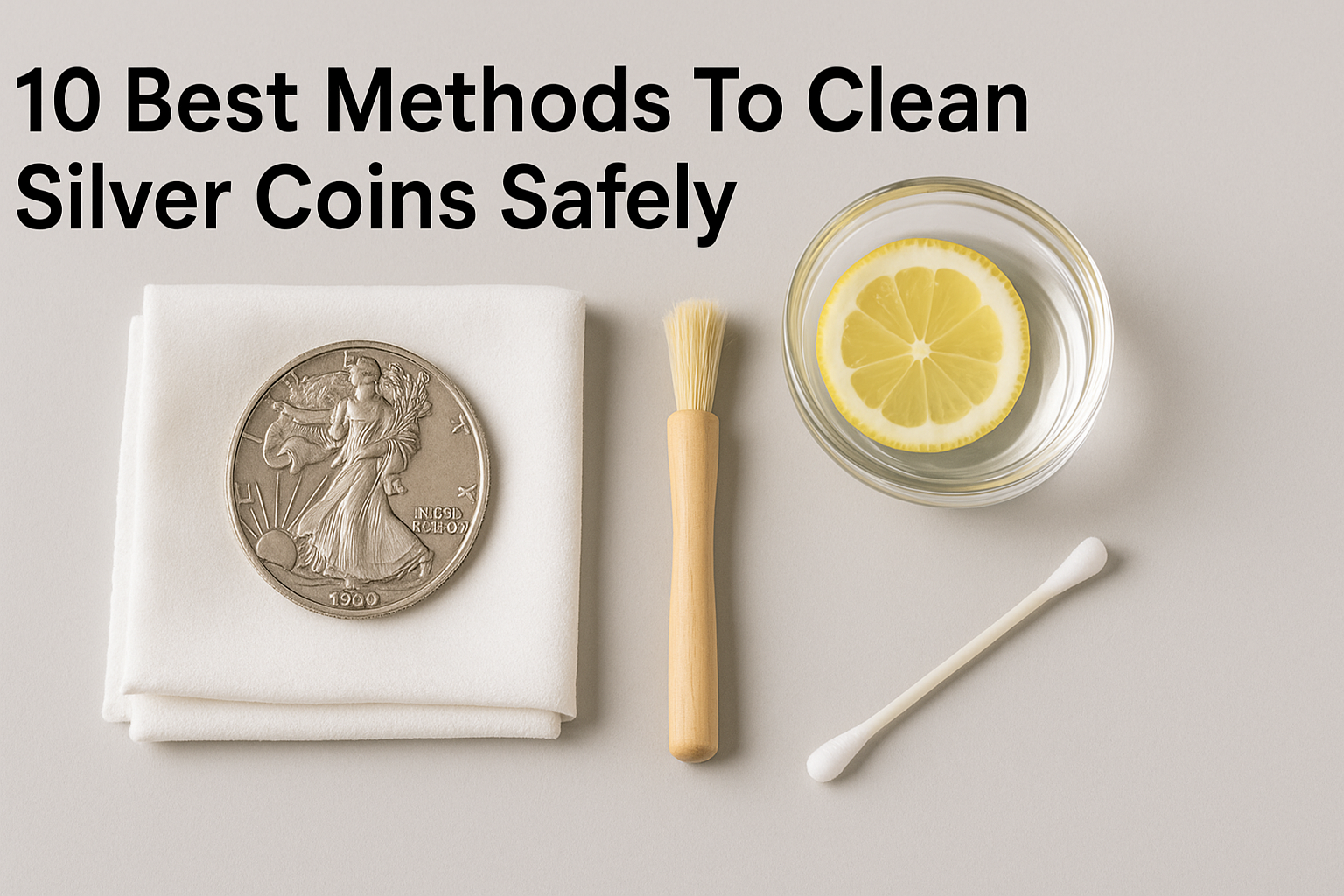

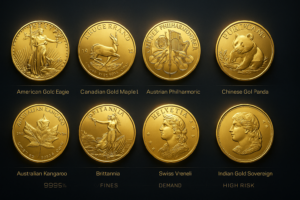
![Read more about the article What Is A Commemorative Coin? [A Comprehensive Analysis]](https://coincollectorium.com/wp-content/uploads/2023/10/What-Is-A-Commemorative-Coin-300x158.webp)